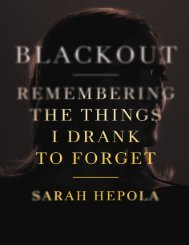Blackout_ Remembering the Things I Drank to Forget
You also want an ePaper? Increase the reach of your titles
YUMPU automatically turns print PDFs into web optimized ePapers that Google loves.
I discussed roofies with Aaron White. Roofies aren’t a myth, he said, but studies suggest <strong>the</strong> fear<br />
outpaces <strong>the</strong> incidence. Turns out, “being roofied” often doesn’t involve roofies at all. People just<br />
don’t realize how common it is <strong>to</strong> experience a blackout. And alcohol can have troubling interactions<br />
with prescription meds. Rohypnol is in <strong>the</strong> benzodiazepine family, often prescribed for anxiety and<br />
sleep disorders. Ativan, Xanax, Lunesta—some of <strong>the</strong> most popular meds on <strong>the</strong> market—can all<br />
create an amnesiac effect when combined with booze.<br />
My <strong>the</strong>rapist was correct. Not everyone has blackouts. The majority of people will never have one<br />
in <strong>the</strong>ir lifetime. But blackouts are not rare in drinking circles. In fact, <strong>the</strong>y’re common. A 2002 study<br />
published in <strong>the</strong> Journal of American College Health found that among drinkers at Duke University,<br />
more than half had experienced blackouts.<br />
I was particularly at risk, even though I didn’t realize it. <strong>Blackout</strong> drinkers tend <strong>to</strong> be <strong>the</strong> ones who<br />
hold <strong>the</strong>ir liquor. If you bolt <strong>to</strong> <strong>the</strong> <strong>to</strong>ilet after your third cosmo, or start snoring after your second<br />
margarita, you won’t build up enough booze in your bloodstream <strong>to</strong> shut <strong>the</strong> machine down. I was so<br />
proud of <strong>the</strong> way I could knock ’em back. I drank fast, and I drank a lot. I was a beer-bingeing Annie<br />
Oakley slinging her empties in<strong>to</strong> <strong>the</strong> trash and popping off <strong>the</strong> next bottle cap with a sly smile. Wanna<br />
watch me go again, boys?<br />
I’m also five foot two. I need a step s<strong>to</strong>ol <strong>to</strong> reach some ceiling fan pulls, and yet I matched a sixfoot-three<br />
boyfriend drink for drink. I also made genius decisions like skipping my dinner, trying <strong>to</strong><br />
cut calories, because I was always scheming my way back <strong>to</strong> <strong>the</strong> size 4 dresses that hung in <strong>the</strong> back<br />
of my closet, like arrowheads from an ancient civilization.<br />
Behold <strong>the</strong> risk fac<strong>to</strong>rs for blacking out: a genetic predisposition <strong>to</strong> holding your liquor, drinking<br />
fast, and skipping meals. Oh, and one more: being female.<br />
For a long time, blackouts were thought <strong>to</strong> be a guy thing. Of course, for a long time, drinking<br />
problems were thought <strong>to</strong> be a guy thing. But researchers now understand that women are more<br />
susceptible <strong>to</strong> blackouts than men. Alcohol metabolizes in our systems differently. Our bodies are<br />
smaller. Hormones can affect how quickly we get drunk. It’s pure biology. Nature, as it turns out,<br />
insists on a few double standards.<br />
The s<strong>to</strong>ries that men and women tell about <strong>the</strong>ir blackouts are different, <strong>to</strong>o. All that alcohol can<br />
strip us down <strong>to</strong> our base drives. Our snarling, animal selves. I’ve heard countless tales of men<br />
waking up <strong>to</strong> find <strong>the</strong>ir faces bruised, <strong>the</strong>ir knuckles bloodied by some fit of unremembered violence.<br />
The s<strong>to</strong>ries women tell are scary in ano<strong>the</strong>r way. As Aaron White says, “When men are in a<br />
blackout, <strong>the</strong>y do things <strong>to</strong> <strong>the</strong> world. When women are in a blackout, things are done <strong>to</strong> <strong>the</strong>m.”<br />
I heard a saying once about drunks. Men wake up in jail cells, and women wake up in strangers’<br />
beds. It’s not like that for everybody. But it was like that for me.<br />
IT WAS SPRING 2010 when I heard <strong>the</strong> term “rape culture.” I was 35, and editing a s<strong>to</strong>ry for an online<br />
magazine, and strapped <strong>to</strong> my desk all <strong>the</strong> time, because I had <strong>to</strong> be.<br />
“I honestly don’t understand what this word means,” I wrote <strong>to</strong> <strong>the</strong> author, in <strong>the</strong> blunt and slightly<br />
irritated language of a frazzled edi<strong>to</strong>r. The feminist blogosphere where she was a leading voice could<br />
get jargony, and I <strong>to</strong>ok a grammar snoot’s delight in reminding writers <strong>the</strong>ir first duty was clarity.<br />
“I bristled at <strong>the</strong> term at first, <strong>to</strong>o,” she responded, and sent me a link <strong>to</strong> a s<strong>to</strong>ry called “Rape<br />
Culture 101.” My eyes scanned a long list of ways that male sexual aggression was favored over





